
Money is a medium of exchange, a measure of value and a store of value
The Keynesian way of thinking emphasizes the medium of exchange aspect of money. The goal of Keynesian monetary policy during recessions is to increase the velocity of money i.e. get people to spend it by increasing the money supply.
Due to the shrinking of the work force an a few other reasons economic growth has been slow in the developed world since the financial crisis of 2008. The response of governments has been fiscal policies aimed at stimulating the economy and ultra-light monetary policies. Interest rates are extremely low and they will be low. Thus bond yields have been low. Because bond yields have been low, investors have bought equities instead.
You could say that investing in low-yield stable and secure bonds is a way of saving. It is definitely a better way to save money than keeping your money in a bank account where your interest rate could actually be negative if fees are taken into account.
Saving money has an unusually high opportunity cost under the current macroeconomic conditions
Despite the fact that consumer prices are dropping owing to various reasons including technological development, equities have rallied. Hence, saving money as opposed to investing it has a high opportunity cost. If you need to park value for a few years, you will actually pay a price in terms missing gains by not investing it in equity markets. In world long gone, you could save money in a bank and gain a substantial passive income. That is no longer possible.
In the current macroeconomic conditions, someone who prefers to delay gratification to be able to afford some large purchase will have to pay a price for that or be forced to invest in the stock market, i.e. buy a share in some business venture and stomach all the uncertainty in that.
Under the current highly abnormal conditions, time has no price, which is absurd and cannot but lead to trouble.
Enter Bitcoin, the ultimate savings technology
I think one of the key reasons for the popularity of Bitcoin is the powerful yearning a lot of people have for a method to store value. Yes, Bitcoin is a speculative vehicle that attracts a lot of people seeking extraordinary gains. But if it were a pointless speculative toy, it would have died a long time ago. When you listen to a lot of people in Bitcoin, you can hear them talk about fiat debasement and storing value time and again.
There are many people who view Bitcoin's long-term future as the ultimate store of value and also as a pristine form of collateral. What the latter means is that holding Bitcoin triggers no tax liabilities or incurs any other costs. Bitcoin is a fully digital form of money, existing only as ledger entries on a blockchain secured by computation power in the league of major governments.
It is highly likely that Bitcoin will suck all speculative value from other stores of value such as gold or prime real estate. Real estate is a very expensive store of value. There are property taxes to be paid. Gold must be guarded. Both real estate and gold are highly illiquid. Gold is traded as derivatives for this reason and there is reason to believe that gold derivatives trade in the non-trustless platforms where it is done is highly manipulated.
Bitcoin mining requires energy consumption and is a requirement for maintaining security. But Bitcoin mining is by nature a highly mobile industry because it's products are mere hash function values can be produced anywhere on Earth. Hence, Bitcoin mining will always utilize that energy production capacity which has no competing uses. The overcapacity of hydroelectric power in Sichuan, China, is a prime example of that.
Conclusion
In Bitcoin, humanity has a digital store of value, once it has achieved mass adoption and after the price discovery phase is over, which no longer exists under the present economic system built on Keynesian principles.